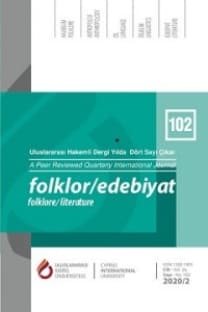Yeni Osmanlılar Tarihi (Histoire Des Jeunes Ottomans) D'Ebüzziya Tevfik: Mémories Ou Récit Historique?
Ebüzziya Tevfikin on bir senelik bir dönemi anlatan Yeni Osmanlılar Tarihi adlı eseri, 1865de kurulan Yeni Osmanlılar Cemiyetinin üyelerini, amaçlarını, faaliyetlerini, dönemin sosyal, politik, kültürel ve edebi olaylarını, bu olayların içinde yer alan kişileri ve yazarın sürgün hatıralarını içermektedir. Yeni Osmanlılar tarihinin anlatıldığı bölümlerde Ebüzziya Tevfik hikâyenin içinde çok fazla yer almaz, o daha çok anlatıcı konumundadır. Çünkü ne Yeni Osmanlılar Cemiyetinin kuruluş aşamasına ne de Avrupadaki sürgün hayatlarına tanıklık edebilmiştir. Hikâyesini duyduklarından, öğrendiklerinden, okuduklarından yola çıkarak kurgular metinde bunun izleri vardır. Ancak ilginç olan o veya onlar ı anlatırken yazarın olayın içine kendisini katma çabasıdır. Bu bir anlamda şunun sorgulanmasıdır: Tarih nerede başlar ya da biter, diğer taraftan benim hayatım nerede başlar ve biter? Kısacası hayatım ve tarihim ayrışabilir mi? Ya da hayatım ve tarihim ayrışacaksa bunu nasıl yapabilirim? Burada hatıra yazarının tarih ve tarihçiyle yakın ilişkisi kendini göstermektedir. Hatıra yazarı da tarihçi de konusunu geçmişten alır. Ancak bunların eserlerini meydana getirirken uyguladıklar metodlar aynı olmadığı gibi eserlerini oluşturma kaygıları da farklıdır. Ebüzziya Tevfikin metninden yola çıkarak bu farkları ortaya koymak mümkündür. Buradan yola çıkarak bu makalede şu soruyu cevaplamaya çalıştık : Ebüzziya Tevfik Yeni Osmanlıların tarihini mi ve/veya kendi tanıklıkları, izlenimleri ve gözlemleri çerçevesinde kişisel tarihini mi kaleme almıştır ?
The history of new Ottomans, Ebüzziya Tevfik: Memories and the history of story
The work of Ebüzziya Tevfik titled New Ottomans describing the period of 11 years includes the members, purposes and activities of New Ottomans Community founded in 1865 as well as the social, political, cultural and literal incidents of stated period, the individuals involved in these incidents and memoirs of the author during his exile. In the chapters describing the historical background of New Ottomans, Ebüzziya Tevfik stands as narrator instead of involving in the story, since he failed to witness the foundation phase of New Ottomans Association, nor the lives on exile within Europe. The author builds up his story through what he heard, learned and readas the text has clues regarding these cases. However, the most interesting issue is the author s effort to add him to the incidents while telling abouthim/her or them . This, in one sense, refers to the examination of following case: Where does history start or end, besides, where does my life start and end? Briefly, shall my life and my history be separated? If so, how can I be able to maintain this? In here, the close relations of author with history and historians reveal. Both the authors of memoirs and historians shape their subjects by the past. However, the methods they applied during forming their works and their concerns on establishing their works are different. It is possible to present these differences by following the text of Ebüzziya Tevfik. By this way, we tried to answer the following question in this essay: Did Ebüzziya Tevfik write the history of New Ottomans and/ or his personal background in respect of his witnesses, impressions and observations?
___
- Birinci, Ali. « Hatırat Türünden Kaynakların Tarih Araştırmalarındaki Yeri ve Değeri » (« La Place et la Valeur de l'Emploi des Mémoires dans les Recherches sur l'Histoire »), Tarih Yolunda Yakın Mazinin Siyasî ve Fikrî Ahvali (Les Conditions politiques et idéologiques du passé proche sur la route de l'Histoire), İstanbul : Dergâh Yayınları, 2001.
- Briot, Frédéric. Usage du monde, usage de soi. Paris : Edition du Seuil, 1994.
- Ebüzziya Tevfik. Yeni Osmanlılar Tarihi (Histoire des Jeunes Ottomans). Edition établie par Ziyad Ebüzziya, İstanbul : Kervan Yayınları, 3 tomes, 1973.
- Gür, Âlim. Ebüzziya Tevfik Hayatı; Dil, Edebiyat, Basın, Yayın ve Matbaacılığa Katkıları (La vie d'Ebüzziya Tevfik; ses apports à la langue, la littérature, aux médias, à l'édition et à l'imprimerie). Ankara: Kültür Bakanlığı Yayınları, 1998.
- Hubier, Sébastien. Littératures intimes, les expressions du moi, de lautobiographie à l'autofiction. Paris : Armand Colin, 2003.
- Türesay, Özgür. Etre intellectuel à la fin de l'empire ottoman : Ebüzziya Tevfik (1849-1913) et son temps. Paris, Institut National des Langues et Civilisations Orientales, Thèse de doctorat, 2008.
